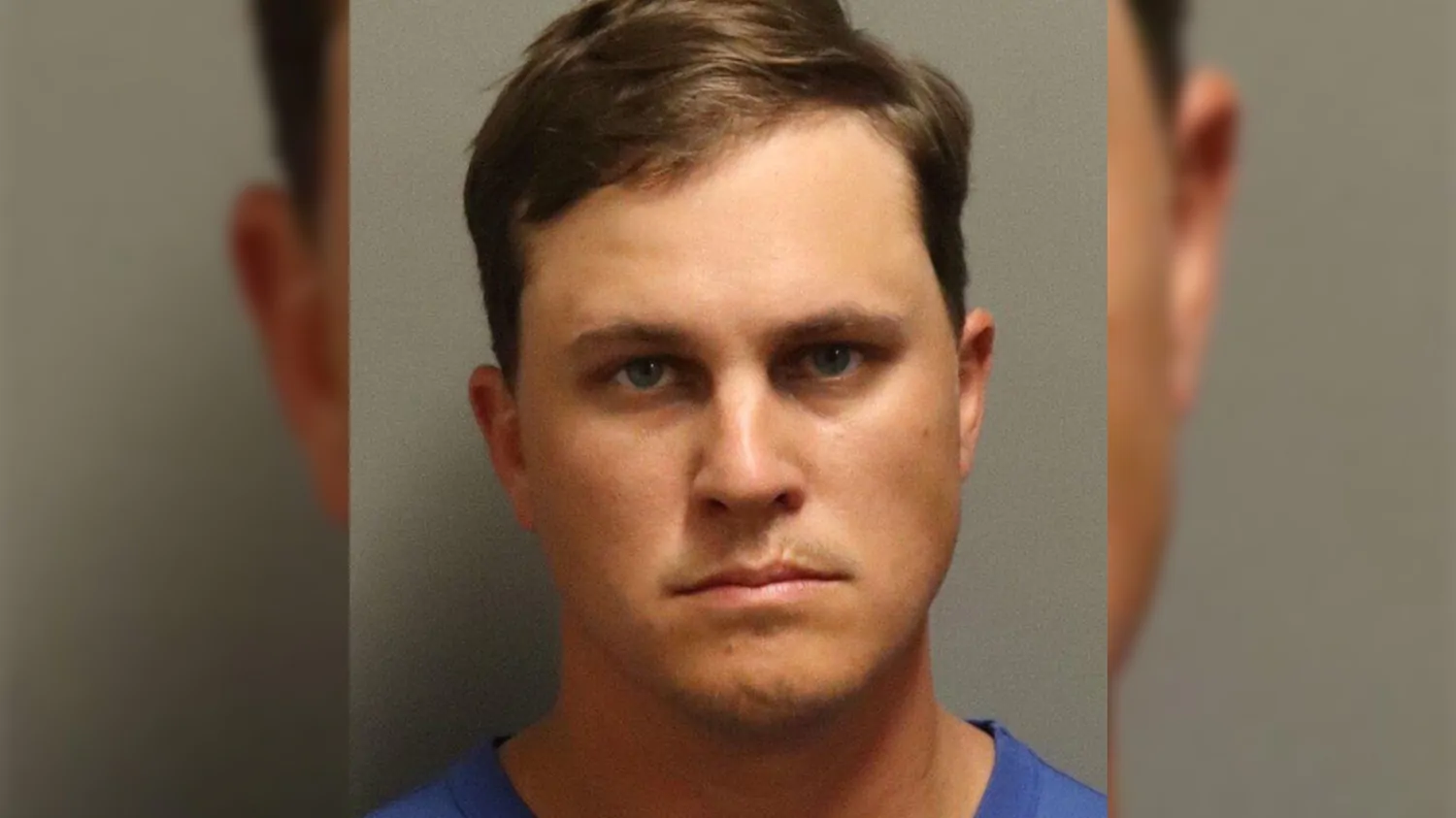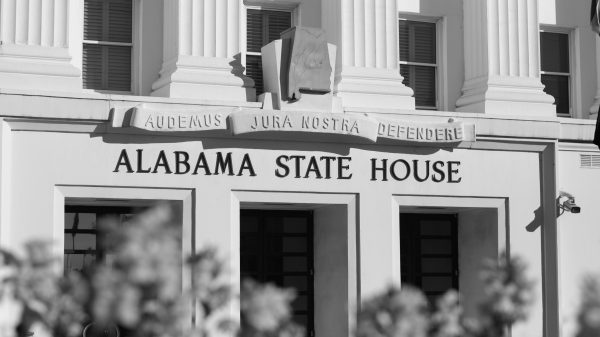Former state Rep. Will Dismukes testified Thursday that he signed a repayment plan with his former employer Weiss Flooring not to pay back money that he stole, but that he rightfully earned by “double dipping.”
Dismukes, the former representative for Prattville, was the only witness in his own defense Thursday as both sides finally finished calling witnesses to the stand. The trial should conclude today with closing arguments and the jury issuing a verdict.
Over the past three days, the state has attempted to illustrate that Will Dismukes significantly overcharged his employer when filling out pay applications for his father Bill Dismukes and then deposited or cashed almost all of those checks through his own bank account.
But Will said he “never stole a penny” from Weiss Flooring company, although he did break company policy by helping his father install flooring while also being project manager.
Will said he would help his father out many times on nights and weekends, either solely in the presence of his father or sometimes completely alone.
Although Bill Dismukes was the subcontractor paid by Weiss, Will said it was common practice among subcontractors including his father to have help doing the work. Those workers are paid out of the money received by the subcontractor on the pay application; Weiss would not control or care what the subcontractor did with that money as long as the work was done.
So in this way, Will Dismukes testified that many of the checks he signed and deposited into his own account included money for work which he himself did and therefore earned.
“It was against company policy; I understood and knew doing it could potentially get me fired,” Will testified. “That $32,000 was work I actually did for Weiss Flooring.”
However, Will testified that he did not do any of the installation work on either the Perry Hill VA Hospital or Prattville City Hall projects that have been major focal points of this case.
But Will Dismukes indicated that on at least one of the pay applications that included payment for work on the VA Hospital project, there was also payment for another unrelated project. Although Will could not verify whether he had done installation work against company policy on that particular project, he used it as an example of how checks during the VA Hospital project could potentially include payment for work he rightfully earned.
Will testified that if he did deposit any checks that were intended solely for work done at the VA Hospital or Prattville City Hall, it would have been because his father had a running tab he owed on installation work Will had done for him.
“That was previous money owed from my father on previous jobs,” Will testified. “It still operates that way.”
Bank records show that Will kept $44,000 in his own personal bank account though, which doesn’t match his claim that he did $32,000 in “double dipping” work.
Will pointed to a 1099 that showed about $20,000 worth of work he completed for his father installing floors in 2017. He also added in other miscellaneous line items and framed that information as being the bulk of how he came to the $32,000 repayment figure agreed to with Weiss Flooring Company president Adam Whitley in January 2020.
Assistant District Attorney Sherri Mazur challenged that notion and recalled the approximately $32,000 figure that investigator Andrew Magnus came to that he said Will overpaid his father on the VA Hospital contract.
“You want this jury to believe that you came up with the rough dollar amount that’s the same as the theft from the VA job that just happened to be $20,000 plus some miscellaneous you-can’t-tell-us-what-it-is?” Mazur pressed. Will responded he was basing that number on the work he actually recalled doing, not just the tax form.
“I’m just trying to be honest,” Will said.
Will said he orchestrated the 2020 meeting with Whitley because Whitley was his “best friend” during his time at Weiss and wanted to repair the relationship after losing another friend to a drug overdose.
“We had a bad argument, and that was the last thing I ever said to (the friend who overdosed),” Will told the jury. “When I left Weiss, it severed the tie between Adam and I … It really bothered me. I wanted to mend the friendship I once had with him.”
Will reiterated that the lunch meeting was not about overbilling the company, but about repaying for the “double dipping” work he had performed. That contradicts Whitley’s prior testimony.
Mazur asked Will if Whitley was lying, then, on the witness stand.
“Yes,” Will responded.
Will also testified that Magnus had misled the jury by testifying that Will’s mother had called Weiss Flooring in 2018 and questioning the $164,000 of work it said Bill Dismukes did for Weiss in 2017.
Magnus also testified that he believed Will overfilled Weiss in part because records show Bill Dismukes performed more than 16,000 square feet of floor preparation despite the project area being less than 7,000 square feet.
But Will said that’s “not that bad” and would represent two coats of patch, which he said he required to make sure the floors were up to standards.
Prior testimony though indicated that very little floor patch was discovered under the vinyl flooring when Weiss contractors returned to the city hall in 2020 to install new floors due to a manufacturer defect in the flooring installed on the initial project.
Will testified that the photos do show that some patching was done and also said it couldn’t be concluded from the photos how much patch may have come up when the flooring was pulled up.
But Magnus returned to the stand and said it was his understanding that there was adhesive on the subfloor when he visited the scene in 2020 and that the adhesive is on top of the patching, suggesting the patch couldn’t therefore have come up with the flooring.
Magnus also asserted that in his meeting with Will, double-dipping never came up.
“This is my first time hearing about double-dipping in reference to this case,” Magnus said.
During Magnus’ previous testimony, he mentioned how Bill Dismukes initially was paid by the pound on the VA Hospital project, but on the third pay application began to be paid instead by square foot. On the third pay application, the amount of pounds of patch used was written down and scratched out to note square footage. The change resulted in a $680 increase in the payout.
Will testified that “any seasoned subcontractor understands the difference being paid by the square foot and being paid by the pound.”
“No matter how old you are, you remember a butt-chewing from your parent,” Will testified. “Dad called me and said ‘If you pay me by the pound one more time I am walking off the job.’”
Will said the change in the payment methodology led to the “most heated” company argument with owner Adam Weiss and then executive vice president David Mills, but said he was ultimately told to proceed.
“He understood not getting screwed over by the company,” Will said of his father.
The Verdict
The jury will be charged today, not just with determining if Will Dismukes is guilty of first-degree theft of property, but whether the case involved one or two instances of aggravating circumstances.
According to the Alabama criminal code, first-degree theft of property is a Class B Felony punishable by 2 to 20 years in prison.
However, there are presumptive sentencing guidelines that take away judicial discretion on certain charges, including this one, and dictate the sentence length.
Based on those guidelines, Will Dismukes would not be going to prison even if found guilty of the offense. Instead, he could spend less than two years in county jail, probation or community corrections.
However, the prosecution successfully added two “aggravators” for the jury to consider.
One aggravating circumstance is that Will Dismukes had a fiduciary relationship with his victim, Weiss Flooring. If the jury believes that the prosecution demonstrated a fiduciary relationship and that Will Dismukes is guilty of theft, they would check this box.
The other aggravating circumstance is repeated victimization of a single victim or a scheme to steal money over a lengthy period of time. If the jury agrees that either condition was met in this case, they would check this box.
If either aggravator is proven, Judge Brooke E. Reid will no longer be held to the presumptive sentencing guidelines and could make her own determination about the consequences for Dismukes, which could include up to 20 years in prison as based in the criminal code.













































